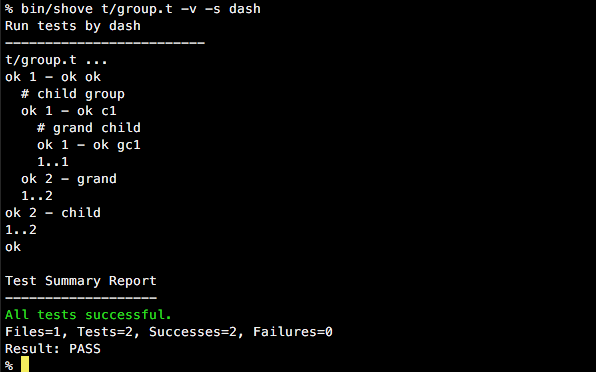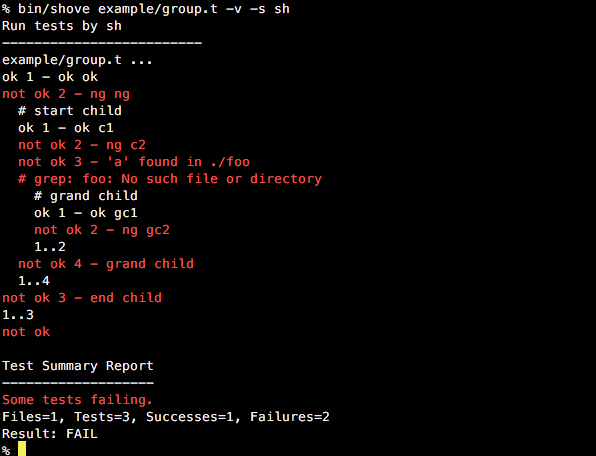Ecosyste.ms: Awesome
An open API service indexing awesome lists of open source software.
https://github.com/progrhyme/shove
Prove-like Test Tool for Shell Scripts
https://github.com/progrhyme/shove
shell-script testing
Last synced: 3 months ago
JSON representation
Prove-like Test Tool for Shell Scripts
- Host: GitHub
- URL: https://github.com/progrhyme/shove
- Owner: progrhyme
- License: mit
- Created: 2016-04-18T12:27:08.000Z (almost 9 years ago)
- Default Branch: master
- Last Pushed: 2020-12-15T10:24:17.000Z (about 4 years ago)
- Last Synced: 2023-08-01T06:43:59.282Z (over 1 year ago)
- Topics: shell-script, testing
- Language: Shell
- Homepage:
- Size: 168 KB
- Stars: 33
- Watchers: 2
- Forks: 4
- Open Issues: 1
-
Metadata Files:
- Readme: README.md
- Changelog: CHANGELOG.md
- License: LICENSE
Awesome Lists containing this project
README
[](https://travis-ci.org/progrhyme/shove)
# shove
A test tool for shell scripts with [TAP](https://testanything.org/) outputs.
The name **"shove"** comes from _"shell"_ and
_"[prove](http://perldoc.perl.org/prove.html)"_ of Perl.
### Table of Contents
* [Screenshots](#screenshots)
* [Supported Shells](#supported-shells)
* [Install](#install)
* [Usage](#usage)
* [Options](#options)
* [How to write test codes](#how-to-write-test-codes)
* [Basics](#basics)
* [Grouping](#grouping)
* [Authors](#authors)
* [License](#license)
# Screenshots
Pass:

Fail:

# Supported Shells
- _sh, bash, dash, ksh, zsh_
_ash_ is not tested, but hopefully supposed to work with **shove**.
No plan to support _(t)csh_ or _fish_ because they are not POSIX compatible.
# Install
Just clone this repository or get tarballs from [releases](https://github.com/progrhyme/shove/releases) page.
```
# example snippet to install `shove`
mkdir ~/src
git clone https://github.com/progrhyme/shove.git ~/src/shove
alias shove="$HOME/src/shove/bin/shove"
shove -V
```
You can make a symlink of `bin/shove` in your favorite path;
i.e. `/usr/local/bin/` or `$HOME/bin/` or any path.
Or you can make an alias command like the snippet above.
NOTE:
Do not change the directory structure because `bin/shove` assumes
its libraries exists in `../lib/` directory.
# Usage
```sh
shove TARGETS [OPTIONS]
shove t/foo.t
shove t/foo.t t/bar.t -s /bin/bash -v
shove -r t/ -v
# help
shove -h|--help
# version
shove -V|--version
```
## Options
* `-s|--shell SHELL` : SHELL to execute tests. Default is `$SHELL`.
* `-v|--verbose` : verbose output.
* `-r|--recursive DIRECTORY` : Search test script files with extension `.t`
under the directory
# How to write test codes
Many test functions get hints from
[Test::More](http://perldoc.perl.org/Test/More.html) of Perl.
There are some example test codes in [example](example) directory.
## Basics
```sh
t_diag "Test for your shell scripts" # Log message visible on the test
t_pass # Always Pass
t_fail # Always Fail
t_ok $exp "exp is true" # [ $exp ]
t_ng $exp "exp is false" # [ ! $exp ]
t_present $str "str is present" # [ -n "$str" ]
t_blank $str "str is blank" # [ -z "$str" ]
t_exist $path "path exists" # [ -e "$path" ]
t_file $path "path is file" # [ -f "$path" ]
t_directory $path "path is directory" # [ -d "$path" ]
t_symlink $path "path is symlink" # [ -L "$path" ]
t_is $a $b "a is b" # [ "$a" = "$b" ]
t_isnt $a $b "a isn't b" # [ "$a" != "$b" ]
t_eq $x $y "x == y" # [ $x -eq $y ]
t_ne $x $y "x != y" # [ $x -ne $y ]
t_gt $x $y "x > y" # [ $x -gt $y ]
t_ge $x $y "x >= y" # [ $x -ge $y ]
t_lt $x $y "x < y" # [ $x -lt $y ]
t_le $x $y "x <= y" # [ $x -le $y ]
t_success $cmd "cmd succeeds" # $cmd; [ $? -eq 0 ]
t_error $cmd "cmd fails" # $cmd; [ $? -ne 0 ]
```
## Grouping
This feature works like `subtest` of
[Test::More](http://perldoc.perl.org/Test/More.html).
New special syntax is introduced in v0.8.1:
```sh
t_ok $ok
t::group "level1 group" ({
t_diag "Comment for level1 tests"
t_ok $lv1_ok
t::group "level2 group" ({
t_diag "Comment for level2 tests"
t_ok $lv2_ok
t_is $lv2_a $lv2_b
})
})
```
These codes are the same as following codes:
```sh
t_ok $ok
(
t_substart "level1 group"
t_diag "Comment for level1 tests"
t_ok $lv1_ok
(
t_substart "level2 group"
t_diag "Comment for level2 tests"
t_ok $lv2_ok
t_is $lv2_a $lv2_b
t_subclose
)
t_subend "level2 group"
t_subclose
)
t_subend "level1 group"
```
Tests in group are run in subshell.
So you can run them in different context from main tests context.
If you want test groups A and B not affect to each other, you have to put them in
different groups.
**CAUTION:**
- **The old grouping syntax `T_SUB (( ... ))` will be unsupported in the future
release.**
# Authors
IKEDA Kiyoshi
# License
The MIT License (MIT)
Copyright (c) 2016-2020 IKEDA Kiyoshi